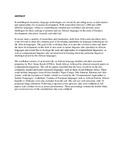| dc.description.abstract | In multilingual situations, language technologies are crucial for providing access to information and opportunities for economic development. With somewhere between 1,000 and 2,000 different languages, Africa is a multilingual continent par excellence and presents acute challenges for those seeking to promote and use African languages in the areas of business development, education, research, and relief aid.
In recent times a number of researchers and institutions, both from Africa and elsewhere, have come forward to share the common goal of developing capabilities in language technologies for the African languages. The goal of the workshop, then, is to provide a forum to meet and share the latest developments in this field. It also seeks to attract linguists who specialize in African languages and would like to leverage the tools and approaches of computational linguistics, as well as computational linguists who are interested in learning about the particular linguistic challenges posed by the African languages.
The workshop consists of an invited talk on African language families and their structural properties by Prof. Sonja Bosch (UNISA, South Africa), followed by refereed research papers in computational linguistics. The call for papers specified that the focus would be on the less-commonly studied and lesser-resourced languages, such as those of sub-Saharan Africa. These could include languages from all four families: Niger-Congo, Nilo-Saharan, Khoisan and Afro-Asiatic, with the exception of Arabic (which is covered by the "Computational Approaches to Semitic Languages" workshop). Variants of European languages such as African French, African English or Afrikaans were also excluded from the call. The call was well answered, with 24 proposals being submitted. Following a rigorous review process, nine were withheld as full papers, and a further seven as poster presentations. These proceedings contain the double-blind, peer reviewed texts of the contributions that were withheld. | en_US |

